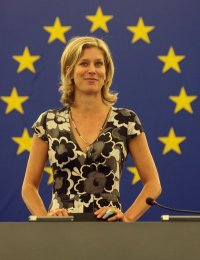Sheriff’s deputies did not violate a Muslim woman’s rights by forcing her to remove her hijab, a religiously mandated headscarf, in a courthouse holding cell, a federal appeals court in San Francisco ruled Monday.
Souhair Khatib sued Orange County for damages under a federal law that prohibits government agencies from imposing a “substantial burden” on the right to practice one’s religion in a prison, jail or pretrial detention facility. She said her religion forbids her to expose her head or neck to men outside her immediate family.
But in a 2-1 ruling, the Ninth U.S. Circuit Court of Appeals said a holding cell, where inmates are kept before being brought into court, isn’t a jail or pretrial detention facility and therefore isn’t covered by the federal law.
The law was intended to protect the religious rights of people who “are sent to reside” in custody, Judge Stephen Trott said in the majority ruling upholding a federal judge’s dismissal of the suit. Trott said a holding cell doesn’t fit that definition because the maximum stay is 12 hours and no one is kept there overnight.
Chief Judge Alex Kozinski wrote an indignant dissent, saying the holding cell is “a full-fledged jail.”
“Can we honestly say that a mammoth facility in the bowels of the Santa Ana courthouse, whose main purpose is to hold inmates while awaiting trial, cannot possibly be a pretrial detention facility?” Kozinski asked. He noted that Congress had declared that the law should be interpreted “in favor of a broad protection of religious exercise.”


 After Belgium’s parliament voted to ban Islamic full-face veils, the German vice-president of the European Parliament has called for a ban of the burka throughout Europe.
After Belgium’s parliament voted to ban Islamic full-face veils, the German vice-president of the European Parliament has called for a ban of the burka throughout Europe. Schools Secretary Ed Balls received a frosty reception from voters as he went head to head with the British National Party in a soapbox debate in West Yorkshire today.
Schools Secretary Ed Balls received a frosty reception from voters as he went head to head with the British National Party in a soapbox debate in West Yorkshire today. As Belgium and France move to ban the burqa, the IRR European Race Audit (ERA) publishes today a briefing paper on ‘The background to the French parliamentary commission on the burqa and niqab’.
As Belgium and France move to ban the burqa, the IRR European Race Audit (ERA) publishes today a briefing paper on ‘The background to the French parliamentary commission on the burqa and niqab’.